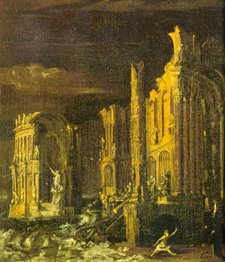Another great contribution of Spain to the world is Atlantis.
MADRID, 14 Mar. (Reuters) -
Atlantis was in Doñana and the tsunami destroyed a
http://http://www.europapress.es/so...a-donana-destruyo-tsunami-20110314112536.html
An international research team led by an American scientist may have finally given the location of the lost city of Atlantis. The legendary civilization was destroyed by a tsunami thousands of years ago and was cibierta by banks of mud in southern Spain.
"This is the power of tsunamis," said Reuters chief investigator Richard Freund. "It's so hard to understand that they can reach more than 90 miles inland, and that's more or less what we're talking about," said Freund, University of Hartford, Connecticut, who led an international team of quest to find the location Atlantis real.
To solve the ancient mystery, the team used a satellite photo of an alleged sunken city to find the site just north of Cadiz. There, buried in the marshes of Doñana National Park, believe it stood the ancient city of Atlantis, consisting of several rings.
Throughout the years 2009 and 2010, the team of archaeologists and geologists used a combination of soil depth radar, digital mapping, and underwater technology to inspect the site.
The discovery of Freund within Spain of a bizarre series of "city monument, built in the image of Atlantis by refugees after the likely destruction of the city by a tsunami, researchers gave added evidence, he said. Atlantis residents that perished in the tsunami fled inland and built new cities, he added.
The team's findings were released Sunday in the documentary "Searching for Atlantis", a special National Geographic chain.
While it is difficult to ascertain the location of Atlantis was in Spain, Freund said the "spin" of their work was to find ruins of cities like the one that was buried in the marshes on the southern coast of Spain. "We found something that nobody else has seen before, which lends credibility, especially for archeology," said Freund.
The Greek philosopher Plato, Atlantis dates back some 2,600 years ago, and described it as "an island opposite the strait known as the Pillars of Hercules, the Straits of Gibraltar today. Using the detailed reference to Plato's Atlantis like a map, searches have focused on the Mediterranean and the Atlantic and the best possible sites for the city.
Tsunamis in the region have been documented for centuries, says Freund. One of the biggest was a 10-story high wave that hit Lisbon in November 1755.
The debate over whether Atlantis really existed has lasted thousands of years. The 'Dialogues' of Plato about 360 BC are the only known historical source of information about the emblematic city. Plato said the island called Atlantis "in a single day and night ... disappeared in the depths of the sea."
Experts plan new excavations at the site creeen found Atlantis and the mysterious "city" about 250 miles inland from Spain to study more closely the geological formations and to date the remains.



